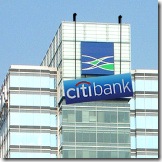Citigroup buys Wachovia.
 Wachova, like WaMu, was a big originator of option adjustable-rate mortgages, which offered very low introductory payments and let borrowers defer some interest payments until later years. Delinquencies and defaults on these types of mortgages have skyrocketed in recent months, causing big losses for banks.
Wachova, like WaMu, was a big originator of option adjustable-rate mortgages, which offered very low introductory payments and let borrowers defer some interest payments until later years. Delinquencies and defaults on these types of mortgages have skyrocketed in recent months, causing big losses for banks.
Wachovia's problems stem largely from its acquisition of mortgage lender Golden West Financial Corp. in 2006 for roughly $25 billion at the height of the nation's housing boom. With that purchase, Wachova inherited a deteriorating $122 billion portfolio of Pick-A-Payment loans, Golden West's speciality, which let borrowers skip some payments.
This summer, Wachovia reported a $9.11 billion loss for the second quarter, announced it planed to cut 11,350 jobs - mostly in its mortgage business - and slashed its dividend. Wachovia also boosted its provision for loan losses to $5.57 billion during the second quarter, up from $179 million in the year-ago-period.
Citigroup has agreed to purchase Wachovia's banking operations for $2.1 billion in a deal arranged by federal regulators, making the Charlotte, NC based bank the latest casualty, paying about $1 per share for Wachovia, according to the New York Times.
The deal expands Citigroup giving it a total of more than 4,300 U.S. branches and $600 billion in deposits and securities in place among the U.S. banking industry's Big Three, along with Bank of America and JPMorgan Chase & Co. Citigroup has now reclaimed its title as the biggest U.S. bank by total assets - $2.91 trillion.
But it comes at a cost: Citigroup Inc. said it will slash its quarterly dividend in half to 16 cents. It will also dilute existing shareholders by selling $10 billion in common stock to shore up its capital position.
In addition to assuming $53 billion worth of debt, Citigroup will absorb up to $42 billion of losses from Wachovia's $312 billion loan portfolio, with the FDIC agreeing to cover any remaining losses. Citigroup will also issue $12 billion in preferred stock and warrants to the FDIC.
The remainder of Wachovia will include its asset management, retail brokerage and certain select parts of its wealth management business, including the Evergreen and Wachovia Securities franchise. It will continue to be a public company under the Wachovia name, and will remain the second largest brokerage and intends to operate independently after the Citigroup acquisition.
Wachovia Securities however, may look for a partner. Wachovia Securities includes A.G. Edwards, which it purchased for $6.8 billion. That integration is expected to be completed by the end of the first quarter of 2009. The brokerage unit manages mroe than $1.1 trillion in assets. Brokers who recently joined Wachovia from A.G. Edwards are not looking forward to a possible sale.
Evergreen investments, Wachovia's asset management division, managed about $245 billion for U.S. investors as of June 20, 2008. However, that division has been hit by the financial crisis. Since the start of September, investors have yanked about $6.6 billion from the three Evergreen money market funds that Wachovia moved to shore up, cutting their assets by about one fifth, according to AMG Data Services.
Wachovia shares, which had slumped as the global credit crisis intensified in recent months, had not traded by early Monday afternoon, even though electronic premarket trades showed them plunging 91 percent to 94 cents. Wachovia's stock, which had traded between $7.80 and $52.25 per share over the past year, closed at $10 per share on Friday afternoon, down from Thursday's closing price of $13.70 per share. It fell more than 90 percent in premarket trading Monday to 94 cents per share. The New York Stock Exchange didn't open Wachovia's shares for trading Monday until the afternoon and traded at $2, still down 80 percent from Friday's close. If you owned stock in Wachovia, it's pretty much worthless. Another slam if anyone invested in Wachovia. Again, a bank gets bailed out of trouble by another bank, and stockholders and investors are left with major losses, and worthless stock.
But what does this mean to Wachovia customers? Absolutely nothing. You can still do all your online and offline banking just like nothing happened. No temporary held funds, no chained and locked bank doors. Everything is the same.
But what doesn't make sense to me is that just a short time ago, Citigroup's investors worried about the possibility of its own collapse given its massive exposure to mortgage-backed securities. Citigroup has not turned a profit for three straight quarters, and lost a total of $17.4 billion during the period after writing down its assets by about $46 billion. That's the largest reduction in asset values taken by any U.S. bank in the current credit crisis. Citigroup said it expects to reduce expenses by more than $3 billion annually as it consolidates certain functions. So, does Citigroup now have more on it's plate with Wachovia than it can handle?
....still making that map to the tree where I buried my money in a mayonnaise jar.
VIDEO: The New Era of Banking Begins via CNN
Image Source: The Consumerist


0 Responses to "Citigroup buys Wachovia."
Post a Comment